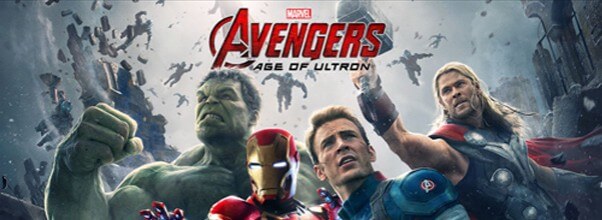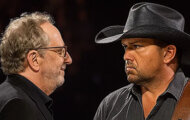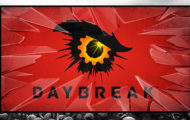Western popular culture seems to have an enduring fascination with superheroes that permeates all forms of media. Films, comic books and video games are all about the deeds and glory of the hero. Perhaps it has always been that way as myth and legend have told tales about those brave few that defy the gods and the odds. For the average person bogged down in ordinary lives of quiet desperation, the hero is a welcome contrivance that allows us to live vicariously even if only for a few brief hours.
For the escape of heroism to work, you need to have a hero fighting a noble cause against dastardly villains. Enter the Avengers: Age of Ultron film. This is the second movie in the Avengers installment of films released by Marvel Entertainment. I admit I am not really a big fan of comic books and superheroes. Given the political correctness that has recently besieged the comic book industry it is a genre that I generally avoid. However, I still like action films and I really enjoyed the first Avengers film which was released in 2012.
To be blunt, the second film fell far short of the expectations the first film had created. And here’s why…
The downfall of this film is the lack of an original and believable plot. Since the heady days of science fiction books to 2001: A Space Odyssey to the Terminator films and beyond, people have been subjected to the same old “machines turning against humans” plot. The message behind the plot is the same: we should never trust machines and instead put our faith in humanity. Director Joss Whedon gives us exactly the same story in Avengers: Age of Ultron but disguises it with the distraction copious amounts of special effects intermingled with hackneyed superhero antics.
From the outset even the title Age of Ultron is false and misleading. An “age” refers to a distinct period of history. The timeline in the film occurs in a couple of days — maybe a week at best. Ultron never really gets to impose an age of influence upon the world.
Another glaring problem is that how Ultron — the proverbial evil robot to end all robots — came to the decision to eliminate humanity from planet Earth is never adequately explained. He doesn’t get corrupted over time, instead he just comes right out of the box as a shiny new homicidal robot with the sole mission to cleanse the world from the scourge of people. His motivations for his actions are never really explained. There is precious little time for explanation of critical plot elements as the film moves along at a furious pace.
The special effects in Age of Ultron were amazing but after a while became tiresome. The human brain can only absorb and process limited amounts of information and the constant barrage of special effects destruction left me feeling exhausted.
The highlight of the movie was the journey that the Maximoff twins traversed from evil to good. There was a lot of emotional depth in the scene between Jeremy Renner and Elizabeth Olsen and it helped to humanize a film full of cardboard heroes and villains. Olsen who played Maximoff and Scarlet Witch gave the best performance in in the film. She’s an underrated actress. I only realized afterwards that she is one of the Olsen twins.
Special mention needs to be made of the moments of tenderness between the Hulk and Black Widow. Along with the scenes at the farmhouse, they provided a humanizing contrast and a much needed oasis of serenity to a film drenched in gratuitous action and battle.
A nagging problem in the film was the voice of Ultron played by the egregiously miscast James Spader. Spader’s instantly recognizable bon vivant personality and condescending voice just didn’t work and became a constant distraction throughout the film. As Ultron was supposed to be an twisted derivative of Tony Stark, I suppose the director was trying to find an actor’s voice of equal stature and gravitas to match Robert Downey Jr.’s jaded hipster voice. It seemed to me that the voice of Ultron should have been more dispassionate and cold instead of being so verbose and philosophic. Ultron’s personality was as artificial as the intelligence he had and felt out of place.
Before I attended the film, I had heard about a controversy where various social media feminists had complained about the lack of strong female characters in the film. These social justice warriors harassed director Joss Whedon with such ferocity that he has left Twitter entirely. So I came into the film with a mental note to look for these “offenses” and found none. I asked my wife who attended Age of Ultron with me if she found anything offensive from a woman’s point of view and she replied that she found nothing at all.
Back to the Avengers…
The moral lesson of the film is that in life shortcuts don’t work. Those that try to impose their change upon the world without debate and consensus have caused untold misery for humanity.
Another moral lesson from Age of Ultron is that artificial intelligence can never replace human wisdom and common sense. Great intelligence and unlimited power without the commensurate wisdom to use it properly, is like giving a toddler a loaded machine gun.
Due to the orgy of action sequences and over-abundance of special effects we never get to adequately examine these moral questions in the film. There is too much effect and not enough cause. Outside of a few sequences of the Avengers debating with each other, central moral thesis of the story is buried.
The big disadvantage with having a movie franchise with so many equal superheroes is that every movie star needs to get adequate face time which ends up leaving little time for critical plot exposition.
I always judge a film by how it affects me after I leave the room. Normally a great action film with special effects makes me feel exhilarated and pleasantly tired — the same way you feel after getting off a great roller coaster ride. Instead I was asking myself, why am I not feeling anything?
I should have left feeling jubilant like I did at the end of Star Trek IV when they saved the planet. Or I could have felt like my consciousness has been expanded when I watched Spielberg’s Close Encounters the first time. This time, I left the theatre feeling flat, drained and strangely indifferent to the superhero genre. After 141 minutes of impossible gymnastics and special effects, all of my energy was sapped from having to continually suspend my disbelief. This could be a far better film with better editing and the inclusion of more story exposition in a possible future director’s cut.
Since the birth of the superhero film genre the release of Batman in 1989, we have seen a steady parade of superhero offerings with no end in sight. The subpar and uninspired Age of Ultron makes me wonder how long Hollywood can continue to milk the superhero theme without the public finally saying enough already. My advice, wait for the Blu-ray release.
-Wolfshead





Wow, I disagree completely with you in regards to James Spader’s performance of Ultron! He was absolutely fantastic. Ultron was supposed to be like Tony Stark and he brought that with relish. Great VO performance. My only complaint was that Whedon wasn’t able to give us more Ultron scenes to more fully develop the character, but given what Spader had to work with he knocked it out of the park.
Fair enough. Ultron played by Spader seems too jaded and cynical right out of the box and we should have gotten to see the journey of how he became that way. So I agree with your assessment that Whedon should have given Spader more Ultron scenes to develop the character.
I thought this story was relevant to the discussion: Superhero movies are ruining cinema, says Exorcist director William Friedkin:
http://www.telegraph.co.uk/film/batman-v-superman-dawn-of-justice/william-friedkin-slams-superhero-movies/